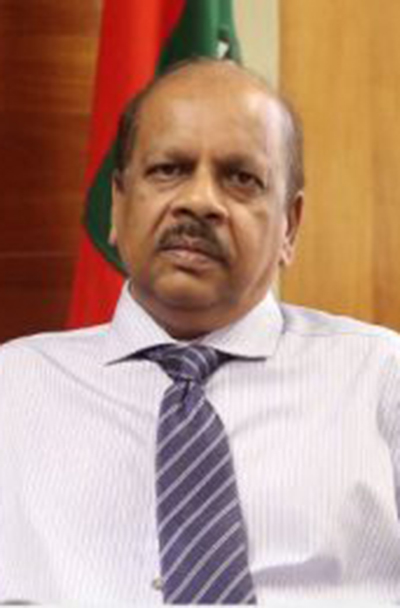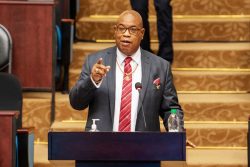With the emergence of the oil and gas sector’s need for insurance liability coverage coupled with the need to safeguard, particularly, local insurance service providers, Guyana’s Commissioner of Insurance Dr Gobind Ganga recently set up a committee to make recommendations for him to submit to government’s local content panel on what they expect.
“We have a representative from Central Bank on the panel with local industry experts and they are tasked with analysing and looking at global best practices to formulate a proposal which I will take to the local content panel,” Dr Ganga yesterday told the Stabroek News.
“They are looking at local content as it pertains to provide or front [those services] for Exxon and the other companies who are coming in to be a part of the petroleum sector,” he further explained.
As head regulator, Ganga said that he does not believe it prudent that his office alone crafts policies needed for implementation and stressed that local insurers must be consulted and be allowed to give their input as to what they envision happening in terms of local content for the industry. He said that he has offered guidance as a representative from Central Bank and will be on the panel to assist with regard to laws of the country and international agreements that govern the insurance sector here.
“We will have a lot of recommendations but we have to also keep in mind that we have an Insurance Act and regional and international agreements and protocols that govern the insurance industry,” he explained.
Giving some background about putting a local content policy into legislation that has been floated here, the Commissioner of Insurance said that while it was recommended to the committee that they look at countries with similar laws, they should also keenly assess the pros and cons and how it could be retrofitted to meet this country’s specific needs since “what works in country A cannot just be taken and inserted for Country B.” “You need insurance that meets international best practices and it must be proactive and relevant to us. We are looking at an innovative way of addressing local content and insurance but also be practical and covers us under the laws and international and regional commitments,” he explained.
For committee member and veteran insurer Peter Abdool, the body gives this country a chance to lead the way in addressing local content participation for locals as it will outline a holistic plan for the industry. “The committee is about a week old but it is charged with creating a policy on how we can benefit and maximise when it comes to local content,” he said.
“Insurance is like any other field, we all want to ensure that there is maximum benefit to Guyanese and to Guyanese local companies. So we will take a long look and clearly define what a local company is and what is not and look at how locals can benefit as we develop,” he added.
Another veteran insurer and broker Keith Evelyn recently expressed his concern on addressing local content, via a Letter to the Editor of Stabroek News.
According to Evelyn, “Guyanese would have to be the dumbest people on the planet if we are going to roll over and let other Caribbean companies benefit directly from the protection of our Local Content Policy [LCP].”
“We have to recognize that virtually every cent spent by oil contractors is deductible from our share of profit/profit oil, so, when the oil contractor wants to buy a beer, a bottle of rum, or a loaf of bread, (remember the list?), we are, in a sense, buying it for them, with our money. Why then should we readily acquiesce that they choose another Caribbean beer over Banks, or, some other Caribbean rum over El Dorado? When they buy a car, should they buy from a dealership owned by Guyanese or from the dealership owned by say, Trinidadians? Who pays? We do. Who profits? We must decide,” he wrote
“Guyana has been one of the poorest English Speaking CARICOM countries for decades, some of which have been doing oil for 100 years. Our industries from distribution, manufacturing, logistics, to financial services are infinitesimal to those of our Caribbean counterparts. Yet there is talk circulating among some ‘Guyanese’ about us approving what is tantamount to opening the floodgates to CARICOM companies in the LCP. We don’t stand a chance against these giants, not in dollars, not in numbers, not logistically, not in experience or any other resource,” he added.
He believes that if local companies cannot meet the requirements for contracts that a policy should be in place to all for partnerships with experienced foreigners that will essentially see the transfer of skills too.
“The fundamental goal of an LCP is to level the playing field for indigenous companies to be able to survive, compete and grow. One key methodology for improving efficiencies in less resourceful indigenous companies, is to direct expert companies that wish to operate, in say Guyana, to form joint ventures and strategic alliances with them,” Evelyn observed.
“In insurance, there are some who, astoundingly, would call for non-Guyanese-owned companies to benefit from our LCP. This discourse includes insurance companies that are subsidiaries of Guyana’s largest indigenous banking, vehicle dealership, and manufacturing and distribution groups. Do their bosses at their Guyanese parent companies know that once the said floodgates are open in insurance, then they are open to their own parent industries? It’s not like there’s much reciprocity,” he added.
Evelyn believes that if there are political, trade, and legislative barriers to Guyana’s LCP exclusively benefitting indigenous persons and companies, now is the time for us to use the leverage afforded us by our oil wealth, to remove them. “Of course, there’s plenty for us to share with our Caribbean brothers and sisters; but if we allow them to overwhelm us, as majority beneficiaries of expenditure that we have to pay for, we might as well tear up the LCP. We Guyanese have a simple decision to make. It’s a ‘no-brainer’,” he declared.







